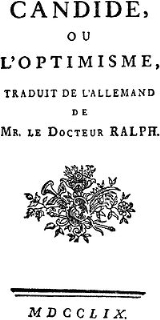
first published in 1759 by Voltaire
, a philosopher of the Age of Enlightenment
. The novella
has been widely translated, with English versions titled Candide: or, All for the Best (1759); Candide: or, The Optimist (1762); and Candide: or, Optimism (1947). It begins with a young man, Candide, who is living a sheltered life in an Edenic
paradise
and being indoctrinated with Leibnizian optimism (or simply Optimism) by his mentor, Pangloss.
Les malheurs particuliers font le bien général, de sorte que plus il y a de malheurs particuliers, et plus tout est bien. ![]()
Si c’est ici le meilleur des mondes possibles, que sont donc les autres?![]()
Si nous ne trouvons pas des choses agréables, nous trouverons du moins des choses nouvelles.![]()
Qu’est-ce qu’optimisme? disait Cacambo. — Hélas! dit Candide, c’est la rage de soutenir que tout est bien quand on est mal.![]()
Dans ce pays-ci il est bon de tuer de temps en temps un amiral pour encourager les autres.![]()
Les sots admirent tout dans un auteur estimé. Je ne lis que pour moi; je n'aime que ce qui est à mon usage.![]()

